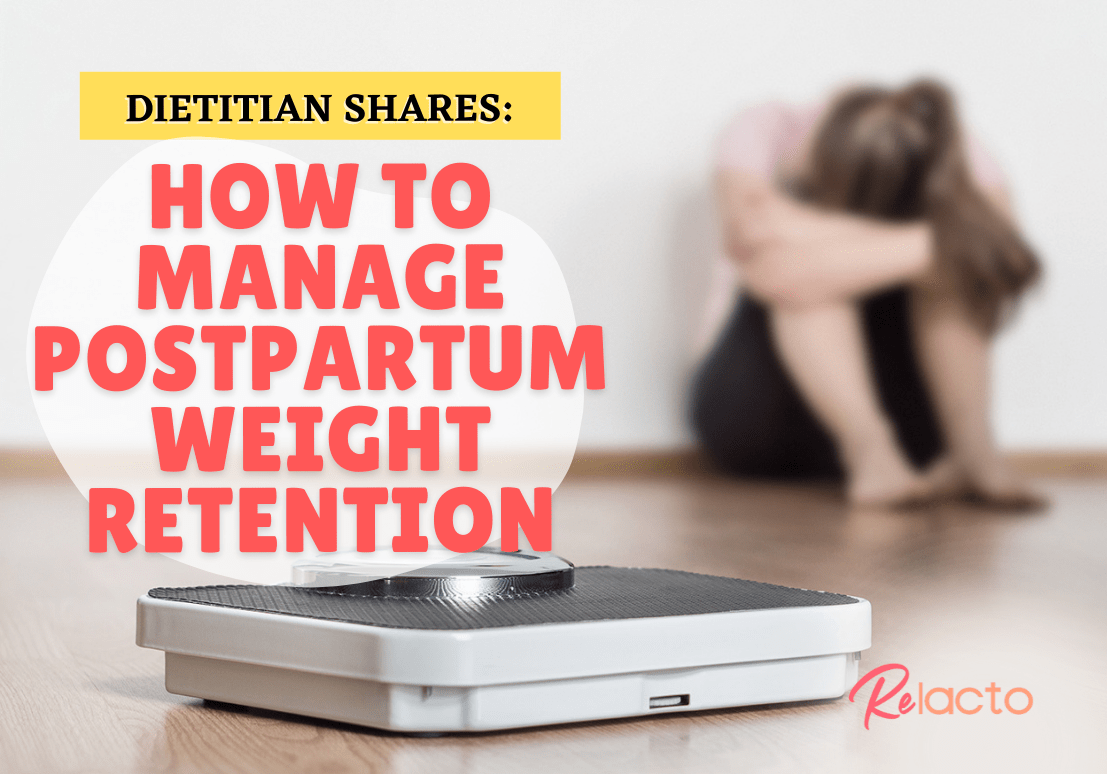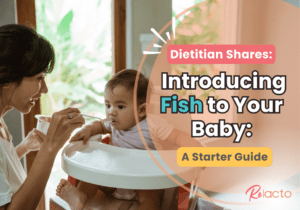Dietitian Shares: How to Manage Postpartum Weight Retention

A woman’s body changes so drastically during the first 9 months of pregnancy, and it can be a difficult experience especially for many that do face body image issues. Besides that, giving birth is also such a challenge and that is probably a life and death experience as well.
After giving birth, one of the main concerns in mothers is postpartum weight retention. It’s only normal for every mother to want to be back to normal (pre-pregnancy weight) as soon as possible, especially after 9 months of such a change. Other concerns could also be increased risk of obesity and diabetes later in life. The stakes are even higher especially during your next pregnancy!
Previous studies have reported that at least 14 to 20% of women were >5kg heavier than their pre-pregnancy weight at 6 to 18 months postpartum. It was also mentioned that retaining more weight after the first year of postpartum is associated with higher body mass index at 15 years later.
So what is it that you can do so that you can manage postpartum weight while still ensuring your health is in check? Here are some tips on what you can do:
Individualized appropriate weight gain during pregnancy
More and more research has been revealing that one of the best ways to manage postpartum weight retention is to start since pregnancy. A local study suggested that weight management even during pre-conception would be helpful too. It’s important to monitor weight gained in each trimester to ensure that both you and the baby are growing well.
IOM Guidelines show that mummies of different BMI categories during pre-pregnancy would have different pregnancy weight gain goals. This is not a hard and fast rule, but the intention for this is so that it would be able to give a better idea of whether any weight gain is due to baby’s growth or maternal adipose tissue.
More often than not, this concept is difficult to convey as many women also struggle with having a healthy relationship with food, body image and weight. All aspects of a mother in terms of her needs, her lived experiences, food availability, current emotional, physical and financial circumstances as well as preferences needs to be considered before any recommendations are given.
Every mother is different and her needs need to be individualized. This has to be done professionally and compassionately between a healthcare provider preferably a Dietitian and a mother.
Staying active during pregnancy and postpartum
Contrary to our Asian practices and beliefs, being physically active during pregnancy is a good thing. Unlike what is portrayed in Asian dramas, mothers should perform regular walks, perform safe resistant exercises like squats, walking lunges and many more. Nowadays, there are endless options for mummies to pick and choose so that it’s enjoyable for her to stay active like pilates, yoga and individualized safe exercises by trained therapists who specialize in exercises for pregnant women.
Mummies should have at least 150 minutes of moderate intensity exercises per week. Not only does it help to manage pregnancy weight gain well, it also helps to promote endorphins which keeps mummies in a good mood, manages appetite, and regulates bowel movements. Besides that, exercising during pregnancy helps to build better leg muscles for a smoother delivery as well as speed up recovery during postpartum. That is definitely a win-win for mummies!
Have good quality meals during the day and avoid late night snacks

One local research done in Singapore found that besides food quantity and quality, food timing and frequency may contribute to weight regulation. What does this mean? It means that having your meals at regular timings during the day and avoiding late night suppers during pregnancy may help to reduce risk of postpartum weight retention.
The data show higher calorie snacks at night may result in excess postpartum weight retention. The theory is that consumption of more calories at lactation diet menu may lead to delay or suppressed nocturnal secretion of melatonin ( a hormone that helps you sleep), which has a linked to obesity as it disturbs the hunger hormones like leptin, ghrelin subsequently disrupting energy metabolism. Thus, leading to weight gain.
Focusing on nourishing foods to recovery during postpartum
That said, we know that mothers should be focusing on nourishing themselves and recovering after childbirth. Instead of fussing over calories in and out during this period of time, mummies should focus on good quality foods that would help them to recover. Focusing on achieving calorie deficit during this time may increase risk of malnourishment which may prolong wound recovery and bleeding. Malnourishment may also put her at a higher risk of falling sick easily too! So it’s important to have a family, a friend, a nanny or a specialized food service provider to assist you during this time. This takes off the unnecessary stress of what to eat which can be emotionally overwhelming as you attend to your newborn during this period of time with your partner.
Lactation diet menu or a breastfeeding meal plan would be able to guide you through postpartum especially after confinement. It’s important to eat balanced, healthily and well during this time as maternal intake does influence some key nutritional contents in the breast milk.
Of course, in general regardless of how you eat, your breast milk will still be the best option for your baby. However, do note at whose expense would that be? If you’re not gonna have sufficient nutritional intake, mummies nutritional stores would eventually deplete too. Food providers like ReLacto also have lactation drink to support you in breastfeeding and keep you hydrated throughout your breastfeeding journey.







